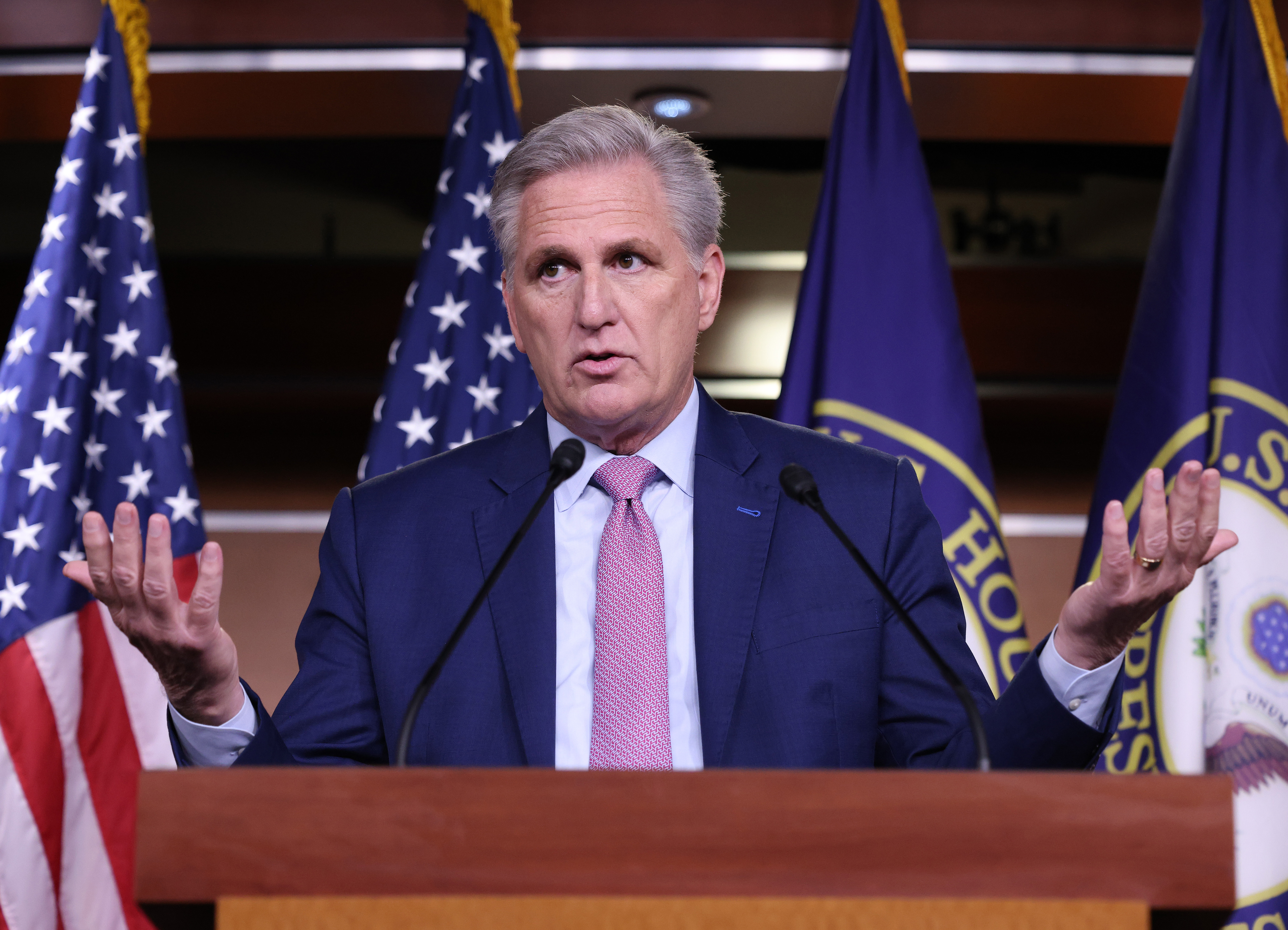Kevin McCarthy's quest to become speaker is off to a lousy start


A free daily email with the biggest news stories of the day – and the best features from TheWeek.com
You are now subscribed
Your newsletter sign-up was successful
With dozens of races still uncalled, the future of the United States House of Representatives remains decidedly in flux. Nevertheless, since all indications point toward a Republican majority after Tuesday's midterm elections, GOP members of Congress have ramped up their jockeying for influence in the coming term. But with the predicted Republican "red wave" manifesting more as a slight ripple against an unexpectedly strong Democratic showing, it's House Minority Leader Kevin McCarthy (R-Calif.) who suddenly finds a once straightforward path to becoming the Speaker of the House decidedly less clear.
"I would say 'not so fast,'" Rep. Andy Biggs (R-Ariz.) cautioned on Wednesday when asked by conservative broadcaster Emerald Robinson about the inevitability of a McCarthy speakership.
"Kevin McCarthy has not done anything to earn my vote for speaker," Virginia Rep. Bob Good told Axios on Wednesday as well. While Freedom Caucus vice-chair and presumptive Judiciary Committee chair Rep. Jim Jordan (R-Ohio) has backed McCarthy's speaker bid, fellow far-right congressman Matt Gaetz (R-Fla.) raised the possibility that Jordan would himself become speaker during a post-midterm podcast interview with his colleague.
The Week
Escape your echo chamber. Get the facts behind the news, plus analysis from multiple perspectives.

Sign up for The Week's Free Newsletters
From our morning news briefing to a weekly Good News Newsletter, get the best of The Week delivered directly to your inbox.
From our morning news briefing to a weekly Good News Newsletter, get the best of The Week delivered directly to your inbox.
In part, the stumbling blocks in McCarthy's path are a product of a natural bartering process between different factions within the GOP: The narrower the Republican's House majority ends up, the more he'll need to appease the rightmost side of his caucus into giving him their votes; already he has promised to reinstate MAGA Rep. Marjorie Taylor Greene (R-Ga.) to her committee posts under a GOP majority. As Greene explained in October to The New York Times: "to be the best speaker of the House and to please the base, [McCarthy is] going to give me a lot of power and a lot of leeway." Should he become speaker, McCarthy will likely be forced to continually appease the hard-right wing of his caucus to secure their crucial support for a legislative agenda that will be largely driven by their bloc.
Beyond the typical wheeling and dealing to secure the speakership, McCarthy must also contend with a growing sentiment among some in the party that the GOP's lackluster midterms performance was somewhat his fault — despite his having raised hundreds of millions of dollars for Republican candidates. Some conservative commentators have called for McCarthy's ousting for failing to lead the Republicans to his promised 60-vote majority, while Gaetz has reportedly been actively whipping colleagues to vote against a McCarthy speaker's bid.
McCarthy has been here before, having failed to succeed then-Speaker John Boehner nearly a decade ago. Unlike then, McCarthy now has the endorsement of the most powerful animating force in Republican politics: former President Donald Trump. But with Republicans increasingly frustrated with what they see as Trump's deleterious influence on the midterm results, some have begun questioning whether the former president might move to deflect those criticisms by joining those in the party looking to blame McCarthy. If he does, it's possible the cracks beginning to show across McCarthy's path to the speaker's gavel could break wide open.
A free daily email with the biggest news stories of the day – and the best features from TheWeek.com
Rafi Schwartz has worked as a politics writer at The Week since 2022, where he covers elections, Congress and the White House. He was previously a contributing writer with Mic focusing largely on politics, a senior writer with Splinter News, a staff writer for Fusion's news lab, and the managing editor of Heeb Magazine, a Jewish life and culture publication. Rafi's work has appeared in Rolling Stone, GOOD and The Forward, among others.
-
 Send Help: Sam Raimi’s ‘compelling’ plane-crash survival thriller
Send Help: Sam Raimi’s ‘compelling’ plane-crash survival thrillerThe Week Recommends Rachel McAdams stars as an office worker who gets stranded on a desert island with her boss
-
 ‘Longevity fixation syndrome’: the allure of eternal youth
‘Longevity fixation syndrome’: the allure of eternal youthIn The Spotlight Obsession with beating biological clock identified as damaging new addiction
-
 How corrupt is the UK?
How corrupt is the UK?The Explainer Decline in standards ‘risks becoming a defining feature of our political culture’ as Britain falls to lowest ever score on global index
-
 Judge blocks Trump suit for Michigan voter rolls
Judge blocks Trump suit for Michigan voter rollsSpeed Read A Trump-appointed federal judge rejected the administration’s demand for voters’ personal data
-
 US to send 200 troops to Nigeria to train army
US to send 200 troops to Nigeria to train armySpeed Read Trump has accused the West African government of failing to protect Christians from terrorist attacks
-
 Grand jury rejects charging 6 Democrats for ‘orders’ video
Grand jury rejects charging 6 Democrats for ‘orders’ videoSpeed Read The jury refused to indict Democratic lawmakers for a video in which they urged military members to resist illegal orders
-
 Judge rejects California’s ICE mask ban, OKs ID law
Judge rejects California’s ICE mask ban, OKs ID lawSpeed Read Federal law enforcement agents can wear masks but must display clear identification
-
 Lawmakers say Epstein files implicate 6 more men
Lawmakers say Epstein files implicate 6 more menSpeed Read The Trump department apparently blacked out the names of several people who should have been identified
-
 Democrats push for ICE accountability
Democrats push for ICE accountabilityFeature U.S. citizens shot and violently detained by immigration agents testify at Capitol Hill hearing
-
 Japan’s Takaichi cements power with snap election win
Japan’s Takaichi cements power with snap election winSpeed Read President Donald Trump congratulated the conservative prime minister
-
 Will Peter Mandelson and Andrew testify to US Congress?
Will Peter Mandelson and Andrew testify to US Congress?Today's Big Question Could political pressure overcome legal obstacles and force either man to give evidence over their relationship with Jeffrey Epstein?
